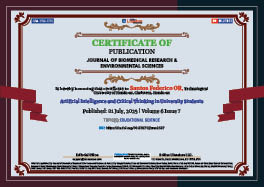Santos Federico OR*, Jonatan R, Edith Margot MR, Hardy Edilberto BP and Felix Alberto GG
Volume6-Issue7
Dates: Received: 2025-06-17 | Accepted: 2025-06-30 | Published: 2025-07-01
Pages: 850-857
Abstract
The objective of this research was to explore the Critical Thinking (CT) skills of university students and the terms related to Artificial Intelligence (AI) that this population reports knowing. A three-part instrument was administered: analysis variables, a scale to assess Critical Thinking [1] and a scale for Artificial Intelligence, created by the authors. A total of 236 students from various universities, both public and private, located in Choluteca, Honduras, participated. The CT results reveal critical judgment skills, such as questioning information, but a low level of argumentation based on statistical or scientific evidence. Although general knowledge of AI is reported, in-depth knowledge of its constituent elements and its evolution is lacking. Certain skills are identified in the use of these technologies, such as writing academic papers and using automated assistants, among others. It is concluded that the surveyed population is not unfamiliar with AI, and that critical judgment should be fostered in educational processes from secondary education to university. Keywords: Critical thinking, artificial intelligence, university students.
FullText HTML
FullText PDF
DOI: 10.37871/jbres2137
Certificate of Publication

Copyright
© 2025 Santos Federico OR, et al., Distributed under Creative Commons CC-BY 4.0
How to cite this article
Santos Federico OR, Jonatan R, Edith Margot MR, Hardy Edilberto BP, Felix Alberto GG. Artifi cial Intelligence and Critical Thinking in University Students. J Biomed Res Environ Sci. 2025 Jul 01; 6(7): 850-857. doi: 10.37871/ jbres2137, Article ID: JBRES2137, Available at: https://www.jelsciences.com/articles/jbres2137.pdf
Subject area(s)
References
- Castellanos D. Factor analysis of a critical thinking scale in El Salvador. Journal of Interdisciplinary Dialogue on Education (REDISED). 2019.
- Turing AM. Computing machinery and intelligence. Mind. 1950;59(236):433–460. doi: 10.1093/mind/LIX.236.433
- Allahrakha, N. UNESCO's AI ethics principles: challenges and opportunities. International Journal of Law and Policy. 2024;2(9):24–36. doi: 10.59022/ijlp.225.
- Romero MI, Joya BO. 21st-Century Competencies: Developing Soft Skills (Communication, Collaboration, Critical Thinking, Creativity). Journal of Research & Practice in Social Sciences. 2024;3(1).
- Timilehin O. AI-powered chatbots and virtual assistants. 2025.
- Andries V, Robertson J. Alexa doesn't have that many feelings: Children's understanding of AI through interactions with smart speakers in their homes. Computers & Education: Artificial Intelligence. 2023;5:100176. doi: 10.1016/j.caeai.2023.100176
- Sami A, Adrousy WE, Sarhan S, Elmougy S. A deep learning based hybrid recommendation model for internet users. Sci Rep. 2024 Nov 26;14(1):29390. doi: 10.1038/s41598-024-79011-z. PMID: 39592677; PMCID: PMC11599862.
- Searle JR. Minds, Brains, and Programs. The Behavioral and Brain Sciences.1980;3(3):417-157. doi: 10.1017/S0140525X00005756.
- Sami A, Adrousy WE, Sarhan S, Elmougy S. A deep learning based hybrid recommendation model for internet users. Sci Rep. 2024 Nov 26;14(1):29390. doi: 10.1038/s41598-024-79011-z. PMID: 39592677; PMCID: PMC11599862.
- Recommendation on ethics in artificial intelligence. UNESCO. 2022.
- Nguyen A, Ngo HN, Hong Y, Dang B, Nguyen BT. Ethical principles for artificial intelligence in education. Education and Information Technologies. 2023; 28(4):4221-4241. doi: 10.1007/s10639-022-11316-w
- Heidegger M. What does it mean to think? Argentina: NOVA. 1952.
- Morin E. Introduction to Complex Thinking. Barcelona: Gedisa. 1994.
- Paul R, Elder L. The Mini-Guide to Critical Thinking: Concepts and Tools. 2003.
- Mastrapa GR, GarcÃa GA, LautÃn LI. Particularities of reflective thinking in primary schoolchildren. Guantánamo University. 2016;123-137.
- Dewey J. How We Think, Barcelona, Paidós. 1989.
- Chan ZC. A systematic review of critical thinking in nursing education. Nurse Educ Today. 2013 Mar;33(3):236-40. doi: 10.1016/j.nedt.2013.01.007. Epub 2013 Feb 6. PMID: 23394977.
- Mendoza. Research and the Development of Critical Thinking in University Students. 2015.
- Kruger J, Dunning D. Unskilled and unaware of it: how difficulties in recognizing one's own incompetence lead to inflated self-assessments. J Pers Soc Psychol. 1999 Dec;77(6):1121-34. doi: 10.1037//0022-3514.77.6.1121. PMID: 10626367.
- Dewey J. How We Think, Barcelona, Paidós. 1989.
- Saiz C, Rivas S. Assessment in critical thinking: A proposal to differentiate ways of thinking. Ergo, Nueva época. 2008;22-26.
- Ennis R. Critical thinking: A rational point of view. Journal of Psychology and Education. 1980;1(1):47–64.
- Hernandez R, Fernandez C, Baptista M. Research methodology. 5th ed. Mexico City: Mc Grill. 2010.